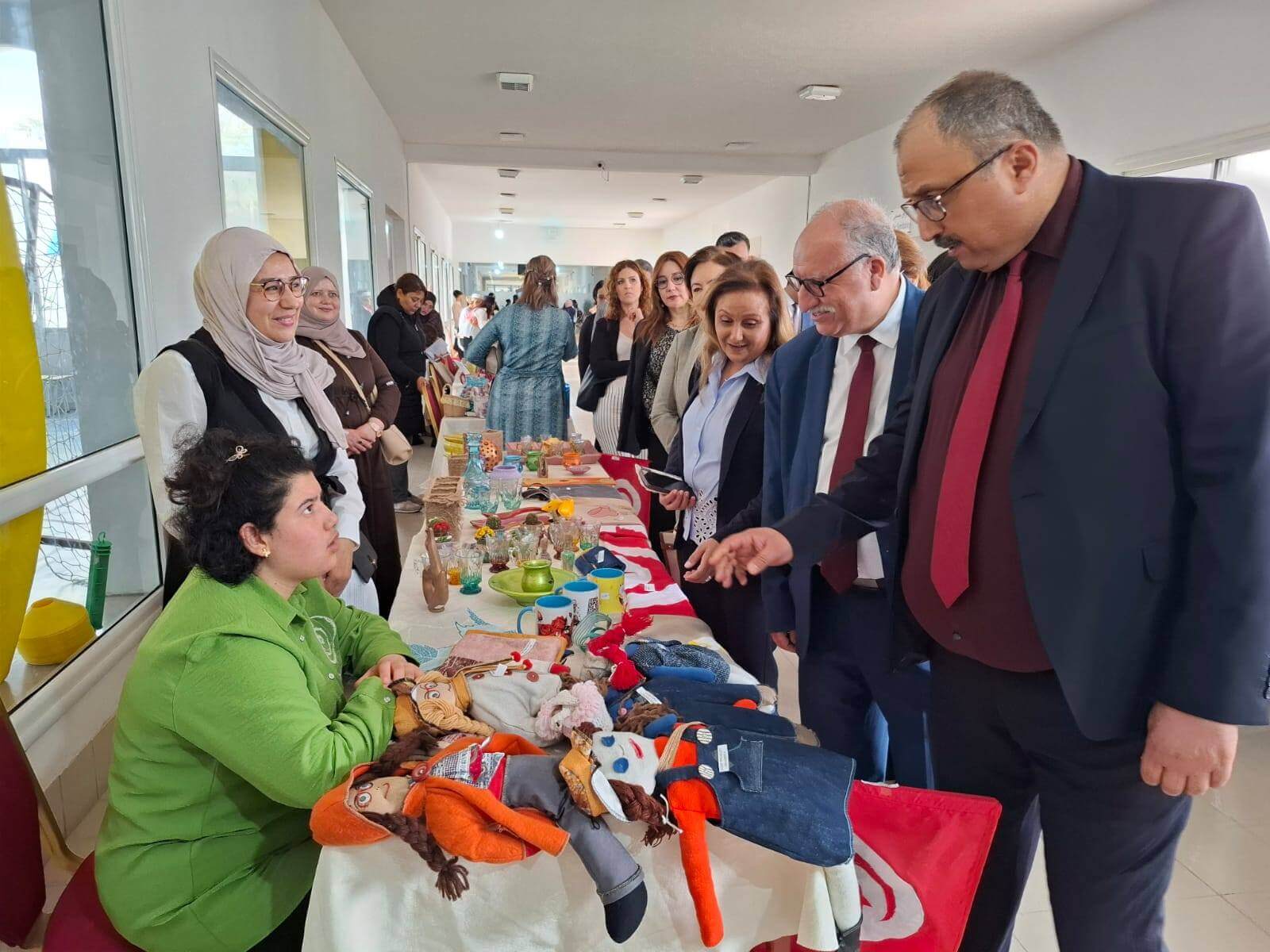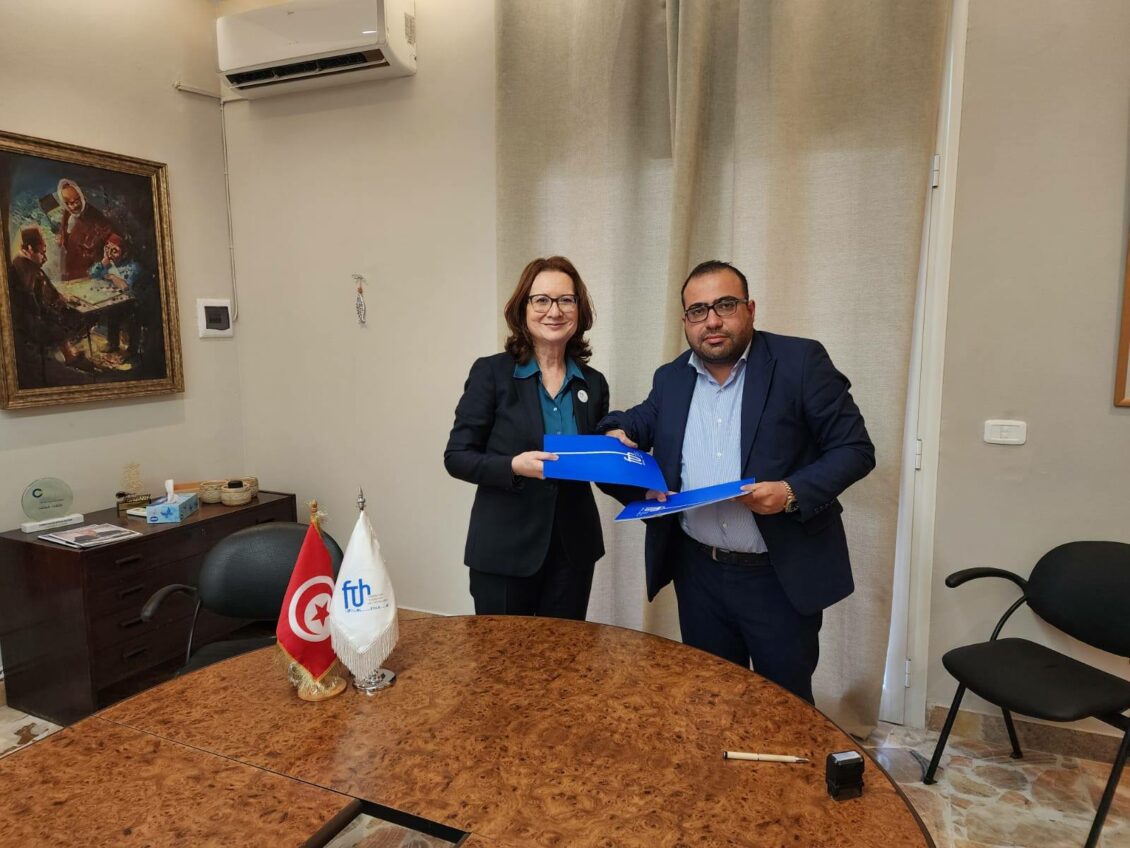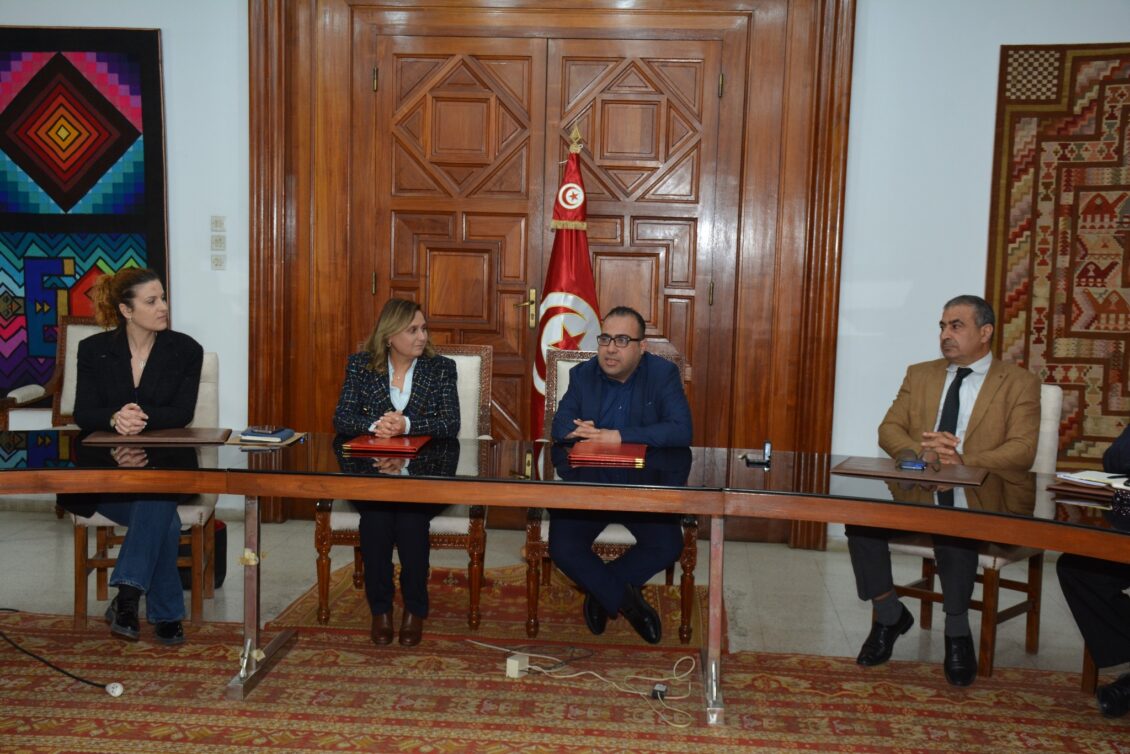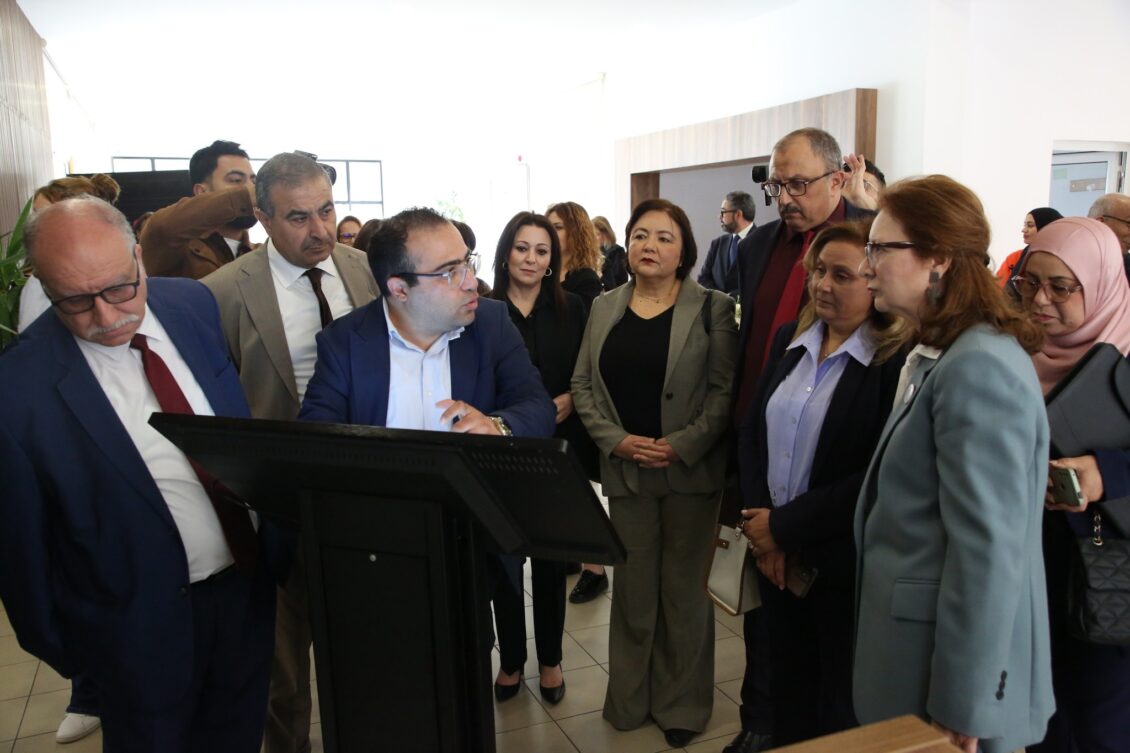Mois : mai 2025
The Tunisian Federation of Hospitality continues its commitment to promoting the professional inclusion of people with disabilities
We are proud to announce the signing of a strategic partnership agreement with the Tunisian Federation of Hospitality (Fédération Tunisienne de l’Hôtellerie – FTH), reinforcing its mission to promote the professional inclusion of people with disabilities.
This partnership seeks to create concrete employment opportunities for individuals with disabilities in the hospitality sector. It also aims to support the promotion and commercialization of handcrafted products made by artisans with disabilities through the HandiArtisan platform.
By joining forces, the two institutions demonstrate their shared commitment to a more inclusive labor market and the recognition of the talents and skills of people with disabilities. The FTH’s engagement reflects a growing awareness within the private sector of the need to advance social and economic equity.
Economic Inclusion of Artisans with Disabilities Through HandiArtisan
Handisuccess International, an organization dedicated to the professional integration of people with disabilities, and the Tunisian National Office of Crafts (ONAT), have just signed a partnership agreement.
This collaboration aims to strengthen initiatives in favor of Tunisian artisans living with disabilities, while promoting Tunisia’s rich artisanal heritage.
The agreement is structured around three major areas. It provides for the integration of artisans with disabilities into programs promoting traditional crafts. This initiative will highlight their talent and their contribution to preserving local know-how.
Second, the partnership includes technical support to improve the quality of handicrafts and strengthen the skills of artisans, aligning them with the latest international standards.
Finally, both parties are committed to supporting the promotion and marketing of these products, both on the national and international markets, thus offering new economic opportunities to these artisans.
Benefiting from the support of institutional and financial partners including Attijari Bank Tunisia and the Tunisian-Italian Chamber of Commerce and Industry (CTICI), this agreement represents a significant step forward in the fight for the economic and social inclusion of people with disabilities in Tunisia.
It is part of a broader dynamic aimed at creating a fairer professional environment and supporting traditional sectors, such as crafts, which play a key role in the local economy.
Launch of the 1st edition of the National Forum for the Promotion of Crafts and Entrepreneurship of People with Disabilities
The first edition of the National Forum for the Promotion of Crafts and Entrepreneurship of People with Disabilities was held on Wednesday, April 17, 2025, at the International Center for the Advancement of People with Disabilities (CIPPH) in Gammarth. The event brought together more than 80 artisans with disabilities, who presented a rich variety of handcrafted products.
Disabled artisans had the opportunity to showcase their creations in specially designed booths, allowing for direct interaction with visitors, including senior officials and forum guests. The diversity of the products on display showcased Tunisian expertise, with creations such as jewelry, wooden furniture, carpets, traditional kitchenware, as well as embroidery and pastries. These works demonstrate the creativity of artisans, who manage to overcome the obstacles associated with disability to offer exceptional products.
Towards opportunities for commercialization and economic inclusion
This forum, organized by the Tunisian National Office of Handicrafts (ONAT), HandiSuccess International, and the CIPPH, in partnership with several chambers of commerce (Tunisia-France, Tunisia-Italy, Tunisia-Switzerland), as well as the Tunisian Hotel Federation and Attijari Bank, aims to strengthen the inclusion of people with disabilities in the economic sector. By showcasing their products, these artisans were able to establish valuable contacts and discuss partnerships with companies and institutions.

During her speech, Leïla Meslati, Director General of the National Office of Crafts (ONAT), highlighted the importance of initiatives aimed at promoting the innovations of artisans with disabilities. She emphasized that it was essential to support these artisans to fully integrate them into the economic sector, while working to promote their products in a truly inclusive manner. She also affirmed that this forum was a decisive starting point for the implementation of the cooperation agreement signed between ONAT and HandiSuccess International, which aims to promote the integration of these artisans into the traditional crafts sector.
Leïla Meslati stated that the Office is actively committed to the qualification of artisans, particularly through their participation in national and international trade fairs. She added that skills development and product quality improvement services are also being implemented to strengthen their competitiveness. She welcomed the initiative to organize an exhibition space for more than 50 artisans with disabilities during this event, a symbolic gesture that illustrates the high level of skill of these artisans.
She emphasized that this forum opens new perspectives, allowing for the organization of professional meetings and the forging of partnerships with public and private companies, as well as with financial institutions, within the framework of shared social responsibility. She also expressed the Ministry of Tourism’s desire to guarantee the best conditions for these artisans, emphasizing that ONAT will remain a constant material and moral support for their initiatives.
Sofien Yacoub, CEO of CIPPH, reiterated the Tunisian government’s commitment to the rights of people with disabilities, citing Article 54 of the 2022 Constitution. He mentioned the various programs implemented by the Ministry of Social Affairs to ensure their integration into various economic sectors. He also discussed action plans aimed at increasing the employment rate of people with disabilities and discussed the financing lines and interest-free loans available to them.
Najet Riahi, director of the General Committee for the Promotion of Persons with Disabilities at the Ministry of Social Affairs, emphasized the importance of collaboration between the state and civil society. According to her, this forum provides a platform for artisans with disabilities to showcase their creations, whether at trade fairs or through digital platforms such as HandiArtisan, aimed at increasing their visibility.
Inclusion in tourism: a fundamental issue for equal opportunities
Dorra Miled, President of the Tunisian Hotel Federation (FTH), reaffirmed the FTH’s firm commitment to the inclusion of people with disabilities, emphasizing the importance of equal opportunities and compliance with applicable laws. She recalled that last February, a strategic partnership agreement was signed with HandiSuccess International, marking a significant turning point in addressing issues related to the professional inclusion of people with disabilities in the hospitality sector.
She stated that this initiative demonstrates the FTH’s deep conviction about the importance of encouraging the employment of people with disabilities and supporting their integration into the world of work. The signed agreement is based on four key areas: identifying the specific needs of the federation’s member institutions, implementing a targeted training program, recruiting and supporting people with disabilities for their professional integration, and supporting artisans with disabilities in promoting and promoting their products. Dorra Miled also expressed her admiration for the exceptional diversity and quality of the products presented during the forum’s activities, emphasizing the importance of highlighting these talents and encouraging recognition of their unique know-how.
Nejah Chrif, founder of HandiSuccess International, highlighted the various digital platforms developed by his organization, such as HandiArtisan, HandiTraining and HandiTalents, which aim to support people with disabilities in their career paths and promote their inclusion in the labor market.
Ihem Brini, Inclusion Focal Point at the United Nations Resident Coordinator’s Office in Tunisia, reaffirmed the UN’s commitment to integrating persons with disabilities into all its actions, in line with its inclusion strategy. She emphasized that several programs have been launched with this in mind, aimed at achieving the Sustainable Development Goals in a resolutely inclusive manner.
She specified that a comprehensive action plan had been developed, involving all United Nations agencies and programs present in Tunisia. According to her, the main indicators of this strategy are based on four fundamental axes: strategic planning and management, total inclusivity, which includes the integration of vulnerable groups, the implementation of programs by UN agencies, and the dissemination of an inclusive institutional culture through strengthened partnerships with civil society and the private sector. In this context, collaboration with HandiSuccess International plays a key role in promoting the integration and employment of persons with disabilities within United Nations agencies and programs.
Ilhem Brini also discussed other initiatives that support this approach, noting that people with disabilities, who represent approximately 15% of the population, must be visible in all sectors and institutions to ensure their true inclusion. She emphasized the importance of changing the perception of people with disabilities, moving from an approach based on compassion to true social and economic inclusion, which is essential for building a more just and egalitarian society.




